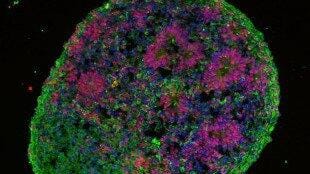Laboratory Mini-brains Help Understanding Idiopatic Autism

 Based on studies on lab-grown cerebral organoids, autism could be linked to an excess of inhibitory neurons. Brain models derived from the skin cells of autism spectrum disorder (ASD) patients allowed to study molecular changes during brain development. An upregulation of transcription factor FOXG1 and the concomitant overproduction of GABAergic neurons could contribute to ASD. The finding from the Vaccarino lab at Yale School of Medicine has been published in Cell.
Based on studies on lab-grown cerebral organoids, autism could be linked to an excess of inhibitory neurons. Brain models derived from the skin cells of autism spectrum disorder (ASD) patients allowed to study molecular changes during brain development. An upregulation of transcription factor FOXG1 and the concomitant overproduction of GABAergic neurons could contribute to ASD. The finding from the Vaccarino lab at Yale School of Medicine has been published in Cell.
The ASD defines a series of neurodevelopmental afflictions characterized by deficits in social interaction, repetitive behavior and restricted interests. Approximately 85% of autism is idiopathic, that is, of unknown and seemingly spontaneous origin. Vaccarino realized that induced pluripotent stem cells (iPSCs) could help understand what happened during brain development. Vaccarino´s team collected skin cells from four ASD patients -and from their fathers as a control-, reverted them to a pluripotent state and then differenciated them into cell aggregates that developed into embryonic mini-brains.
ASD patients derived organoids have an excess of inhibitory neurons
The researchers performed RNA sequencing to find out any differences in gene expression between patients and controls. They found that ASD patients’ genes involved in cell proliferation, neuronal differentiation, and synaptic assembly were overexpressed. The upregulation, however, only affected GABAergic neurons; γ-Aminobutyric acid (GABA) is the main inhibitory neurotransmitter in mammals. Checking again the gene expression data, the team discovered that the transcription factor FOXG1 was consistently upregulated in all patients. The mechanism that would link both events is yet unclear, but it seems that an excess of inhibitory neurons affects connection patterns.
Cerebral organoids can help in discovering common traits between patients of other idiopatic illnesses like Parkinson, amyotrophic lateral sclerosis (ALS) or Alzheimer.
Source: http://www.the-scientist.com/?articles.view/articleNo/43523/title/Mini-Brains-Model-Autism/
